To make sure you have everything to comply with your States General Contracting licensing requirements we have prepared this handy guide. Please note that requirements are constantly changing and while every effort is made to ensure the accuracy contained in this blog you need to check with any State or local government before you proceed.
I would advise you to scroll down to find your State as for many of the States we have insider tips that may save you thousands of dollars in addition to time and aggravation.
A to Z
Alabama

General contractors must have a state license in Alabama to work on any construction, alteration, maintenance, repair or demolition project that costs more than $50,000. You will also need a license if you work on residential projects over $10,000.
Alabama requires three references as part of the license application. You will also need financial statements prepared by a certified accountant and other proof that your business is registered.
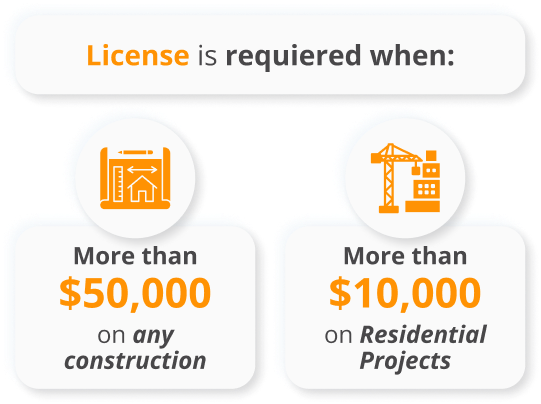
The license is awarded by the Licensing Board for General Contractors. Applicants must pass a trade exam, and a business and law exam. You will also need a resume of your work experience and show proof of general liability insurance. Your application with required fees $300 for general contractors, $150 for subcontractors. These applications must be submitted at least 30 days before quarterly board meetings. Residential roofing Contractors must also provide a $10,000 bond made out to the State.
Alabama does have reciprocity with Mississippi, Tennessee, Arkansas and Louisiana. You have to be licensed for 3 years consecutively with the same classification you are wanting in Alabama. This form is called verification of license, and is included in the Prime Application and under the forms section of the Alabama State website. You will need to include a current copy of your license in one of the above States with your application.
For more information general contractor license requirements in Alabama.
Alaska

General contractors must hold a state license to work in Alaska. There are three:
Alaska General Contractor with Residential Endorsement Registration requires A $20,000 bond or a cash deposit is required. A certificate of insurance for public liability and property damage insurance and evidence of workers’ compensation insurance is required. Fees are a $250 license fee and $100 application fee.
Alaska General Contractor without Residential Contractor Endorsement Registration A $25,000 bond or a cash deposit is required. .A certificate of insurance for public liability and property damage insurance and evidence of workers’ compensation insurance. Fees are a $250 license fee and $100 application fee.
Alaska General Contractor -Handyman Registration A $5,000 bond or a cash deposit is required.
You must hold general liability insurance and worker’s compensation insurance. Fees are a $250 license fee and $100 application fee.
For more information general contractor license requirements in Alaska
Arizona

Any general contractor who builds, alters, repairs, adds to, subtracts from, improves, moves, wrecks or demolishes any structure must hold a state general contractor license to work in Arizona. There are a number of various license classifications from commercial , residential and dual license classifications for contractors that do both residential and commercial work. There is a $200 application fee along with a $580 license fee for commercial licenses. Residential fees are $180 application fee, $320 license fee and $370 recovery fund assessment.
Bonds range in the amount of $5,000 to $100,000 based on the projected amount of work performed within Arizona.
Applicants with one or more employees must provide a certificate of insurance verifying workers’ compensation insurance coverage.
For more information general contractor license requirements in Arizona.
Arkansas

A commercial license is needed if a contractor performs work of $50,000 or more, including, but not limited to, labor and materials, on a commercial project. Any project that is not a single-family residence is a commercial project.
A residential builders license is needed to build a single-family residence, if the cost of the project is more than $2,000, including, but not limited to, labor and material, unless an exception applies. A Residential Builders License also allows you to perform remodeling on a single-family residence.
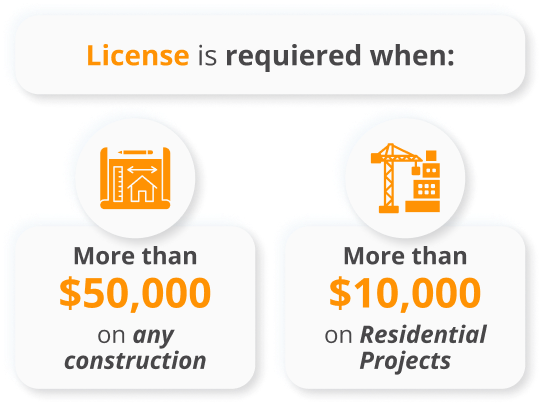
Subcontractors of PROPERLY LICENSED contractors can work with a REGISTRATION certificate instead of a full license. If there is a contract with a properly licensed contractor, then that is a subcontractor. If there is a contract with the owner (written, verbal, otherwise, it does not matter) that is considered a PRIME contractor, not a subcontractor. If the PRIME contractors does not have an appropriate Commercial Contractors license, then the subcontractor would need a Commercial License.
A home improvement license is needed to do specialty work on a single-family residence, if the project is more than $2,000, including, but not limited to, labor and material. This license is for a contractor who is only responsible for certain types of work (painting, roofing, flooring, etc.). This license does not allow you to build a home or remodel a home.
The fee is $100
You need to provide:
- Three (3) references on forms approved by the State. The references should not be from a supplier or banker, unless they have observed your work and can describe it.
- Copy of the Arkansas Business and Law passing test score.
- A “Reviewed” or “Audited” financial statement from a CPA (CPA cannot be an “in-house” CPA) must be submitted showing minimum net worth requirements for license applied for.
- If you have one or more employees, you must have Worker’s Compensation insurance coverage. You will need to provide a current certificate of insurance verifying Worker’s Compensation insurance coverage.
- Fully executed $10,000.00 Contractor’s Bond is also required.
For more information general contractor license requirements in Arkansas
California

All general contractors in California must hold a state license from the California Contractors State License Board for any work worth more than $500.
Applicants with one or more employees must provide a certificate of insurance verifying workers’ compensation insurance coverage. Liability insurance, with an aggregate limit of $1 million, for licenses with five or fewer persons listed as personnel; plus an additional $100,000 for each additional personnel listed on the license; not to exceed $5 million total (LLC licenses only).

All contractors must have a $15,000 contractor’s bond on file with CSLB. An additional $12,500 qualifying individual’s bond must be filed for contractors that are qualified by a responsible managing employee.
All LLC licenses are required to obtain a $100,000 surety bond as well. This bond requires financial statements and excellent credit to obtain. If you are just starting out this can be very difficult and expensive to obtain. You should look into the possibility of forming some other type of entity. Advice of an attorney is advised.
The qualifier for a contractor license must pass both the law and business exam, and a specific trade exam, unless they meet the requirements for a waiver. No trade exam is required for the C-61 Limited Specialty license.
Several fees are also involved, including a $330 application fee and a $200 license fee. Once you have a license you’ll need to renew it every two years, which costs $450.
Colorado

There is no General contractors State license to work in Colorado. However, many local governments have general contractor license requirements. The best practice is to google the name of the town or city where you are going to work. You will then be able find any specific requirements for qualifications, insurance and bonds required.
Connecticut
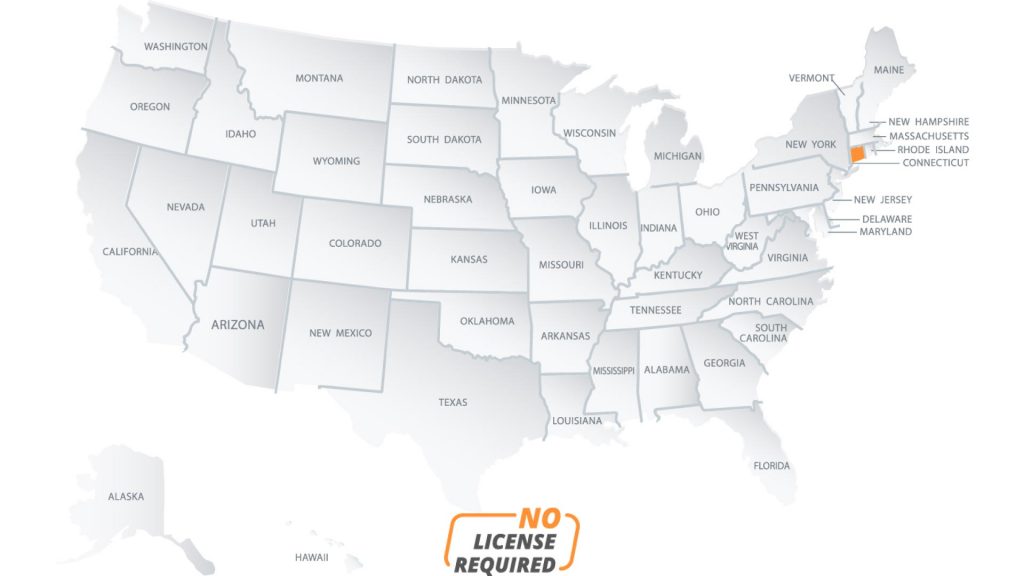
Connecticut does not require general contractors to hold a state license. However, some local governments have general contractor license requirements. The best practice is to google the name of the town or city where you are going to work. You will then be able find any specific requirements for qualifications, insurance and bonds required.
If you do work on residential properties you will be considered a home improvement contractor. Anyone who performs or offers to perform any home improvement totaling more than $200 for any single contract, or improvements totaling more than $1,000 in any 12-month period is considered a Home Improvement Contractor (HIC). In this case you will have to register with the State. The information on HIC Licensing can be found HERE.
Delaware
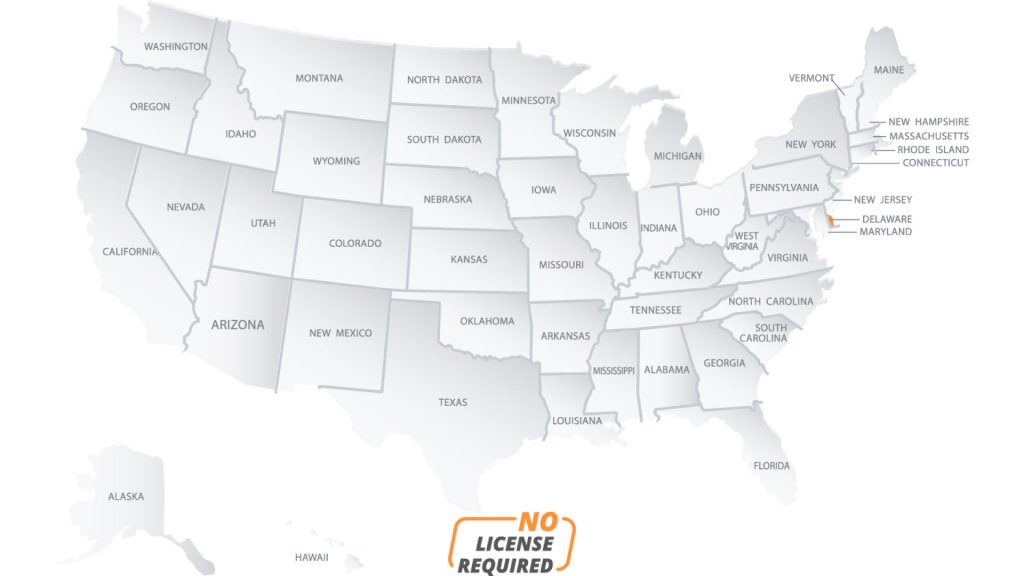
General contractors in Delaware do not require a trade license. You will need to obtain a business license and register with the Delaware Division of Revenue.
Florida
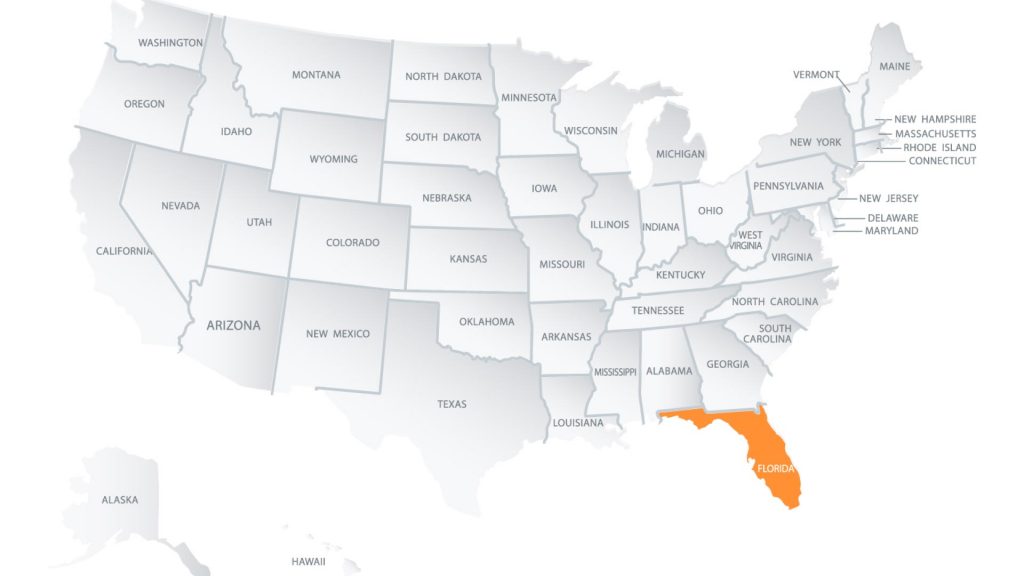
General Contractors must have a state license to work in Florida. The license is awarded by the Florida Department of Business and Professional Regulation. The application can be found HERE.
There are different types of licenses based on what kind of classification your business falls under:
A certified license allows contractors to work anywhere in the state. A registered license allows contractors to only work in specific areas in the state.
A “certified contractor” means any contractor who possesses a certificate of competency issued by the department and who shall be allowed to contract in any jurisdiction in the state without being required to fulfill the competency requirements of that jurisdiction. Certified contractors are designated by an occupation code which begins with the letter “C“.
A “registered contractor” means any contractor who has registered with the department pursuant to fulfilling the competency requirements in the jurisdiction for which the registration is issued. Registered contractors may contract only in such jurisdictions. Registered contractors are designated by an occupation code which begins with the letter “R“.

You will need to show proof of four years of experience, or a combination of education and experience (with up to three years of education are able to substitute for experience). You must show proof of financial stability, as well as liability and worker’s compensation insurance in Florida. You will need to pass a trade exam, as well as a business and law exam. You may be able to register with the state and then apply for a trade license at the local, county or city level.
Georgia

“General contractor” means a contractor whose services are unlimited as to the type of work which he or she may do, subject to the financial limitations as may be imposed by a subclassification. Any work contractually undertaken by a general contractor in the nature of electrical contracting, plumbing, conditioned air contracting, low voltage contracting, or utility contracting may not be performed by the general contractor but shall only be performed by a person who is duly licensed to perform such work.
“Residential contractor” means any contractor who may contract for, undertake to perform, submit a bid or a proposal or otherwise offer to perform, and perform any activity or work as a contractor requiring license or a fixed price, commission, fee, wage, or other compensation
Currently, Georgia has established reciprocity with Louisiana and Tennessee as an available method by which to obtain a license.
Applicants must obtain general liability insurance in a minimum amount of $500,000 per occurrence and submit a signed, current certificate of insurance with your application.

Non-refundable $200.00 application fee by check or money order payable to State Licensing Board for Residential and General Contractors.
Only the general contractor license requires a minimum net worth. A general contractor must have a minimum net worth of $150,000 and a general contractor limited tier must have a minimum net worth of $25,000.
Applicants must show proof of workers compensation insurance, if required by Georgia law.
ALL THE CLASSIFICATIONS
Learn more about Georgia general contractor license and insurance requirements.
Hawaii

You may apply either as a sole proprietor or an entity (corp., LLC, etc.). If applying as an entity, you must also complete the responsible managing employee (“RME”) application. An applicant (sole proprietor or RME) must verify 4 years of supervisory experience in the license classification for which the applicant is applying.
The filing deadline to turn in applications is on or before the first Tuesday of the month prior to the scheduled Contractors License Board (“Board”) meeting date, provided it is a complete application. If your application is approved by the Board, then you (sole proprietor or RME) must sit for the exam. Upon passing the exam, the applicant must submit licensing fees; proof of liability and workers compensation insurance (if you have employees); and a bond, if required by the Board.
You are only exempt if the aggregate contract price for a project, including labor, materials, taxes, and all other items, is not more than $1,000.00 and does not require a building permit. Renewal fee – $353.00 for contracting entity and sole proprietor, and $208.00 for responsible managing employees.
Hawaii Contractor License Board
Idaho
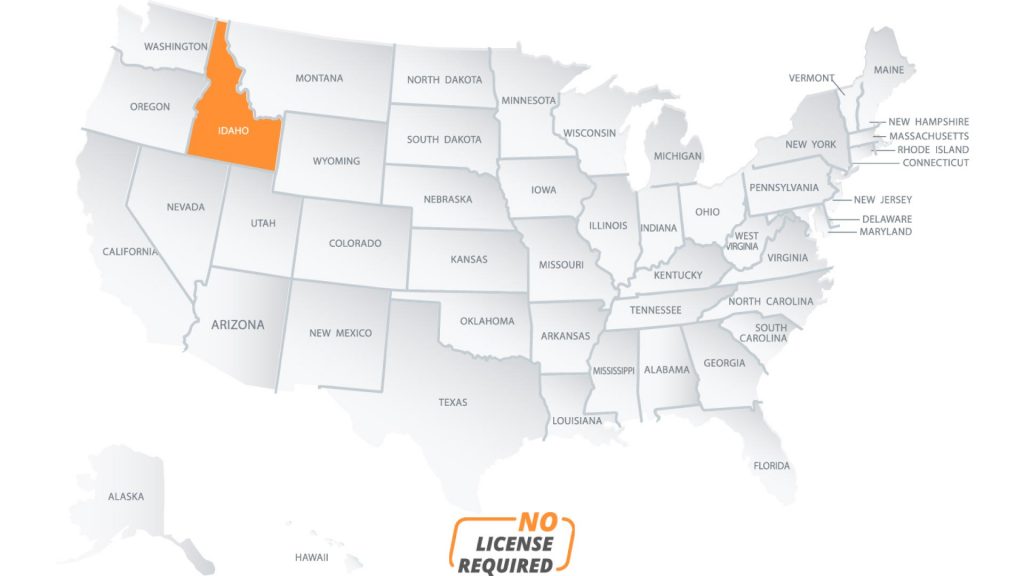
Illinois
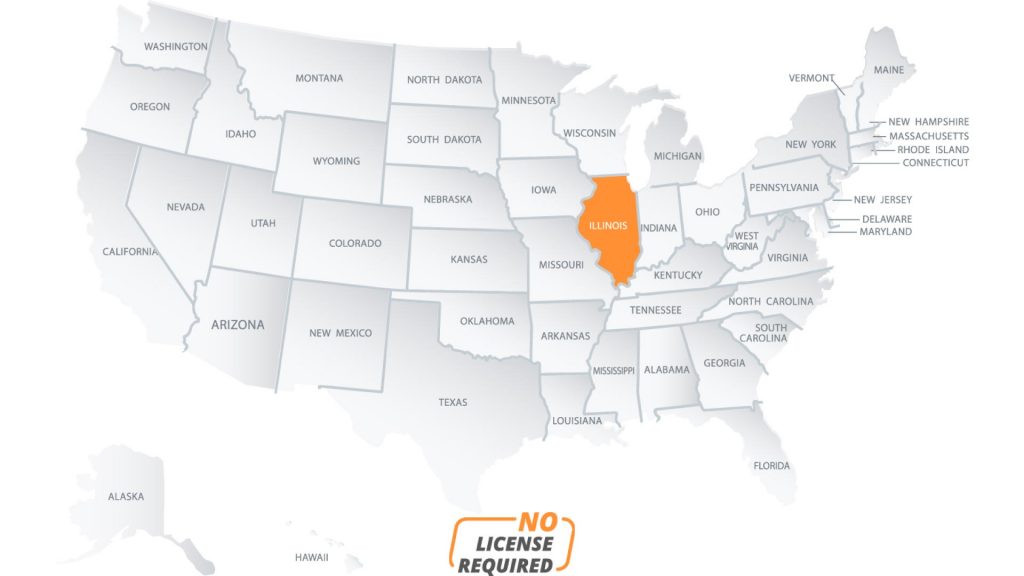
Illinois does not have a state license requirement for general contractors. However, you will have to get a permit or register with many municipalities. In most cases insurance and a bond is required before you can start work .
Also Chicago requires specific licenses based on the value of projects your business will work on. You will need certificate of insurance with the City of Chicago as additionally insured and policy limits ranging from $1 million to $5 million depending on the sizes of your projects
Sign and complete the application
You must also pay all licensing fees, which vary according to license class:
- Class A – $2,000 fee for an unlimited contract amount
- Class B – $1,000 fee for projects up to $10,000,000
- Class C – $750 fee for projects up to $5,000,000
- Class D – $500 fee for projects up to $2,000,000
- Class E – $300 fee for projects up to $500,000
Learn more about general contractor license and insurance requirements in Chicago.
Indiana

General contractors do not need a state license to work in Indiana. Make sure to check the licensing requirements with local governments before you begin work.
Consolidated City of Indianapolis (Marion County), Lake County and South Bend/ St. Joseph County all have their own requirements that include General Liability Insurance and a bond for registration.
Iowa
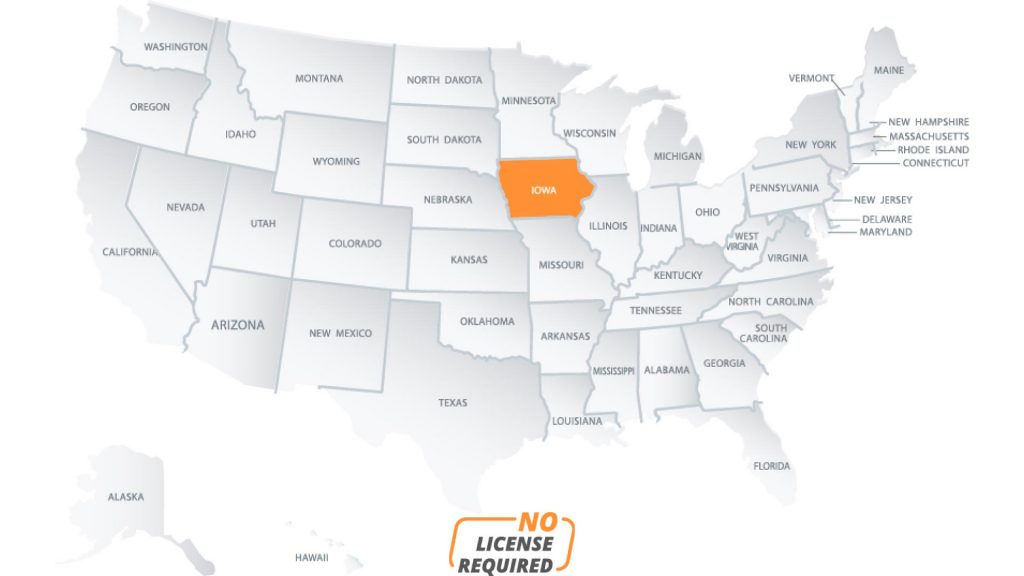
There are no state licensing requirements for general contractors in Iowa. However, any construction contractor who earns at least $2,000 a year doing construction work, must register with the Iowa Division of Labor.
If you are an out of State Contractor who wants to work in Iowa, you will need a $25,000.00 Out of State Contractor Bond to make sure any taxes are paid to the State.
A contractor with employees must send a Certificate of Insurance from the workers’ compensation insurance company showing the effective date of coverage and listing the Iowa Division of Labor.
Kansas
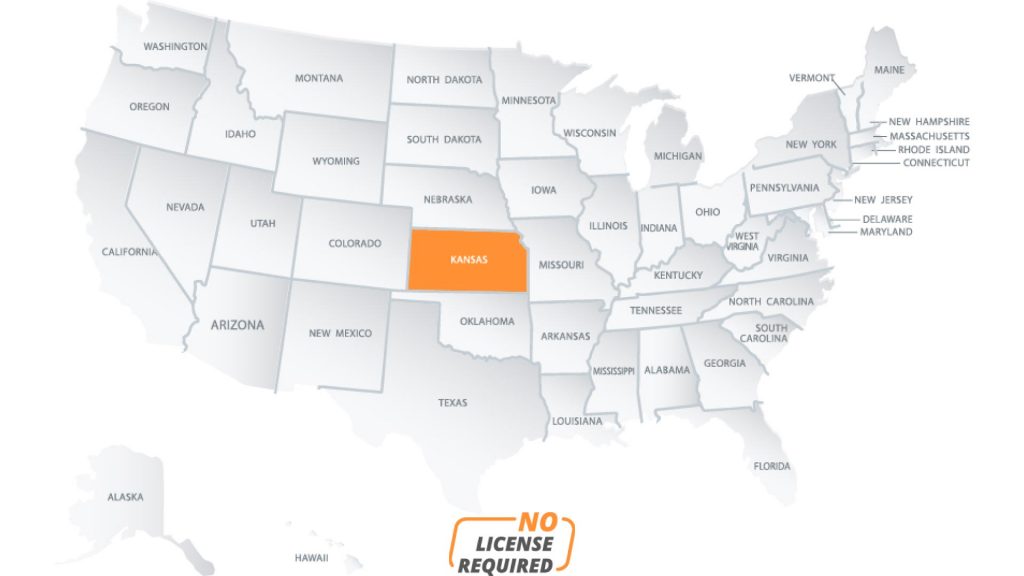
General contractors do not need a state license in Kansas. However, there are local licensing requirements so make sure to check these before you begin work.
Kentucky
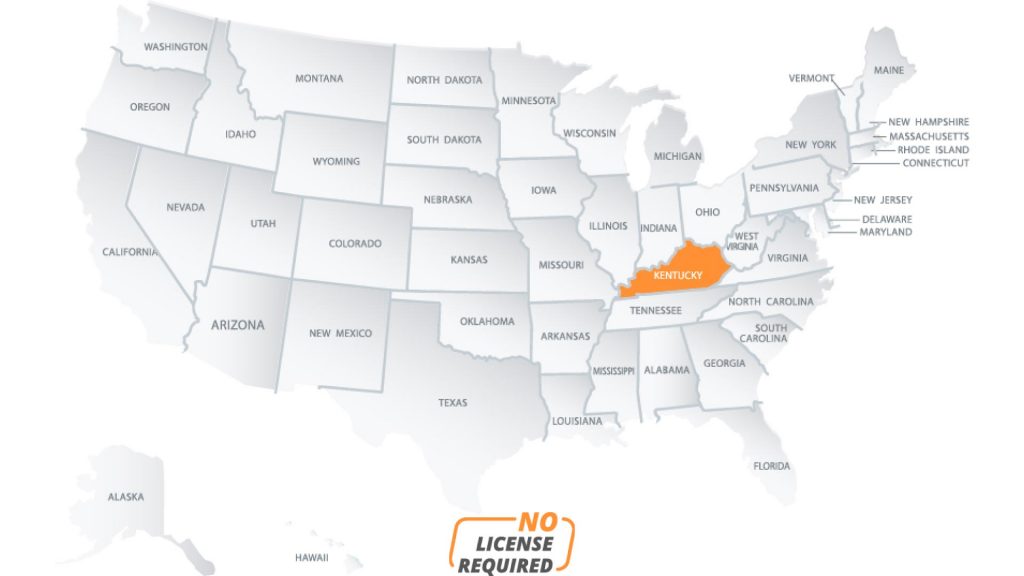
You do not need a state general contractor license to work in Kentucky. All licensing is done at the local city/county level so make sure to check this before you begin work.
Louisiana

General contractors must have a state license to work in Louisiana. There are four main types of licenses Commercial, Residential, Mold Remediation and Home Improvement. These license types are as follows:
- Commercial projects with a value of $50,000 or more including labor and materials; general contractors must hire properly licensed subcontractors.
- Residential construction of a building or structure, to be used as a residence, with no more than four incorporated or attached dwelling units, where the cost of labor and materials will exceed $75,000
- Mold Remediation projects with a value of $1.00 or more including labor and materials.
- Home Improvement projects with a value exceeding $7,500 but not in excess of $75,000 including labor and materials. This registration does NOT cover swimming pools.
Learn more about Louisiana general contractor license and insurance requirements.
Maine
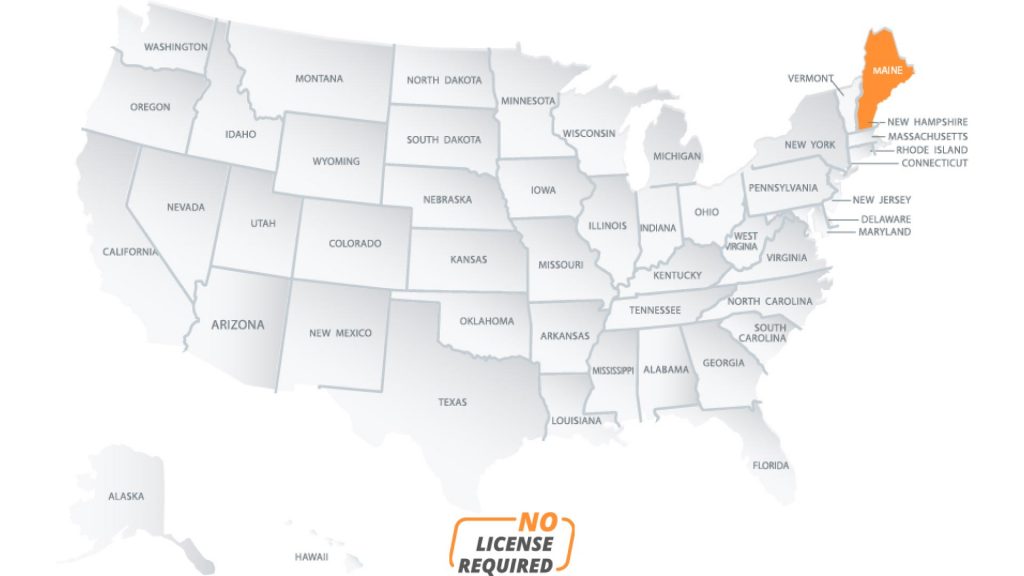
As a general contractor, you do not need a state license to work in Maine.
All licensing is done at the local city/county level so make sure to check this before you begin work.
Maryland

As a general contractor, you may or may not need a state license, depending on the work you do. For new home construction, you don’t need a state license, but you do need to register with the Home Builder Registration Unit of the Office of the Attorney General. If you plan to do work on existing residential property, you will need to get your Maryland Home Improvement Contractor’s License (MHIC) from the Maryland Department of Labor, Licensing and Regulation.
If you perform home improvement projects, you will need a license which is issued by the Maryland Home Improvement Commission.
Commercial contractors must register at the city/county level. Applications for a construction license are made with the Clerk of the Circuit Court in your county if you plan to work on new construction projects, excavating or curbing and paving streets or sidewalks.
Learn more about Maryland general contractor license and insurance requirements.
Massachusetts

For certain construction projects, oversight from a licensed construction supervisor is required.
For 1- and 2-family homes and\or appurtenant structures of any size.
- A licensed construction supervisor or a registered design professional (RDP) must oversee construction.
For most existing 1- to 4-family owner-occupied homes.
- A licensed construction supervisor or a registered design professional (RDP) must oversee construction.
- A contractor must also register with the home improvement program.
For buildings less than 35,000 cubic ft. of enclosed space.
- A licensed construction supervisor or registered design professional (RDP) must oversee construction, including for manufactured buildings.
For buildings greater than 35,000 cubic ft. of enclosed space.
- A registered design professional (RDP) – engineer or architect must control the construction of larger buildings.
- A construction supervisor license is not required for larger projects since the RDP is considered the licensed person for the project.
- Always check with the municipal building official in the city\town in which the project is located for additional licensing requirements.
Learn more about Massachusetts general contractor license and insurance requirements.
Michigan

All residential builders and maintenance and alteration contractors who construct, repair, alter or improve a residential or combination residential and commercial structure are required to be licensed.
You need a license if you are engaged in the construction of a residential structure or combination residential and commercial structure, or persons who undertake the repair, alteration, addition, subtraction or improvement of a residential structure or combination residential and commercial structure for compensation other than wages for personal labor.
A sales tax license is required with the Department of Treasury, Sales, Use and Withholding Tax Division as well.
Learn more about Michigan General Contractor License and insurance requirements.
Minnesota
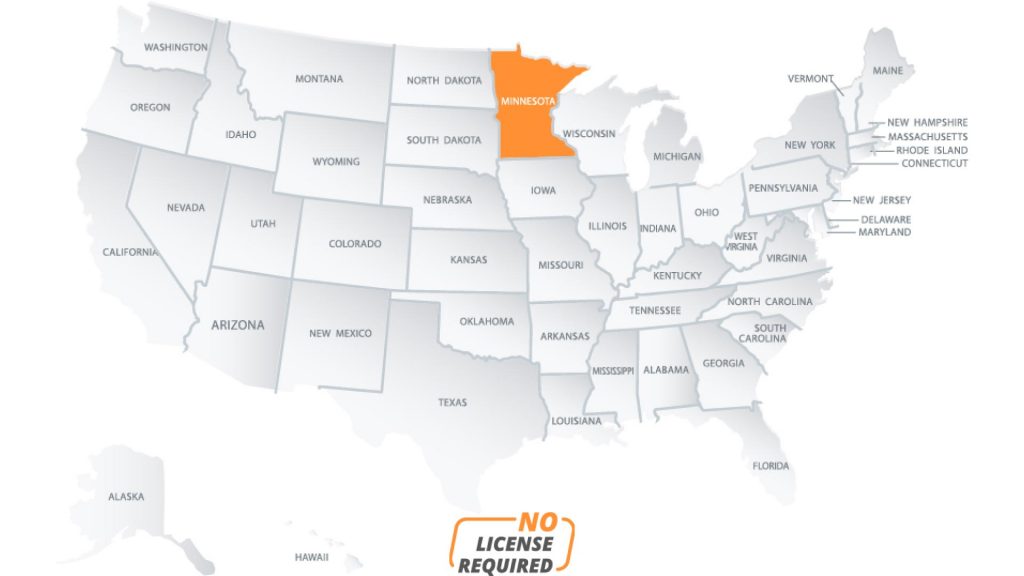
A general commercial contractor does not need a state license to work in Minnesota. However, a residential building contractor or remodeler does need a license.
Each licensee shall have and maintain in effect commercial general liability insurance, which includes premises and operations insurance and products and completed operations insurance, with limits of at least $100,000 per occurrence, $300,000 aggregate limit for bodily injury, and property damage insurance with limits of at least $25,000 or a policy with a single limit for bodily injury and property damage of $300,000 per occurrence and $300,000 aggregate limits.
Applicants are also required to complete the certificate of compliance with Minnesota Workers’ Compensation Law. License applicants must designate one individual to serve as a “qualifying person” (QP) regardless of whether the licensee is an individual proprietorship, partnership, LLC or corporation. The QP must take the required exam and fulfill the continuing education requirements for the licensee.
Learn more about Minnesota General Contractor License and insurance requirements.
Mississippi

General commercial and residential contractors must hold a state license to work in Mississippi on projects worth more than $50,000. The licenses are issued by the Mississippi State Board of Contractors. You have to pass a trade exam, as well as a business and law exam. You must show proof of general liability insurance.
Applicants for a major classifications must give proof of a net worth of at least $50,000. For minor classifications the net worth requirement is $20,000. A reviewed or audited financial statement including the last 12 months financial statements must be submitted with the application. Applicants must also have an active Department of Revenue sales tax or use tax account before applying.
Learn more about Mississippi General Contractor License and insurance requirements.
Missouri
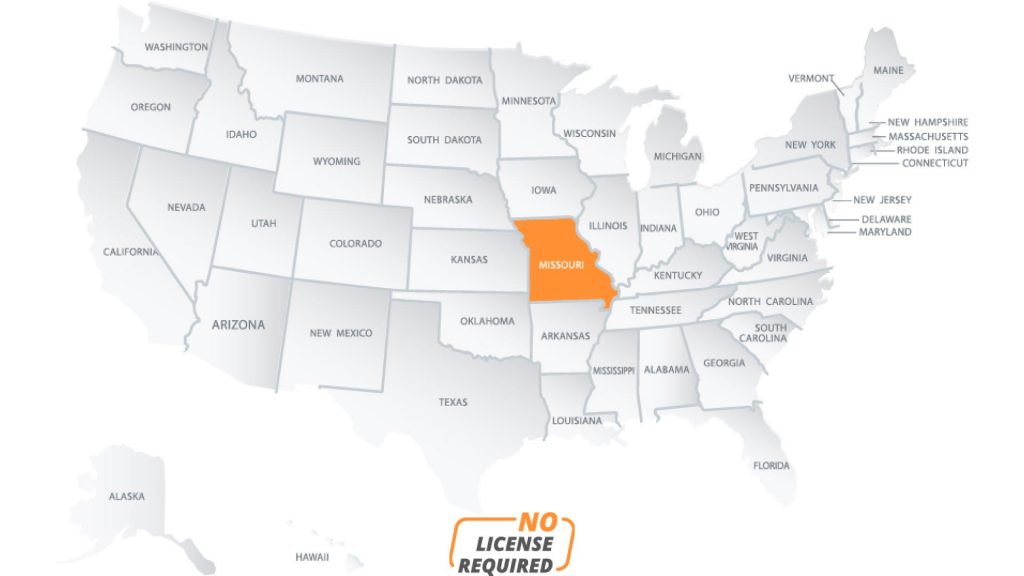
General contractors do not need to obtain a state license to work in Missouri. Licensing is done at the local level so check with the local municipality for any permit or registration requirement.
Learn more about Missouri General Contractor License and insurance requirements.
Montana
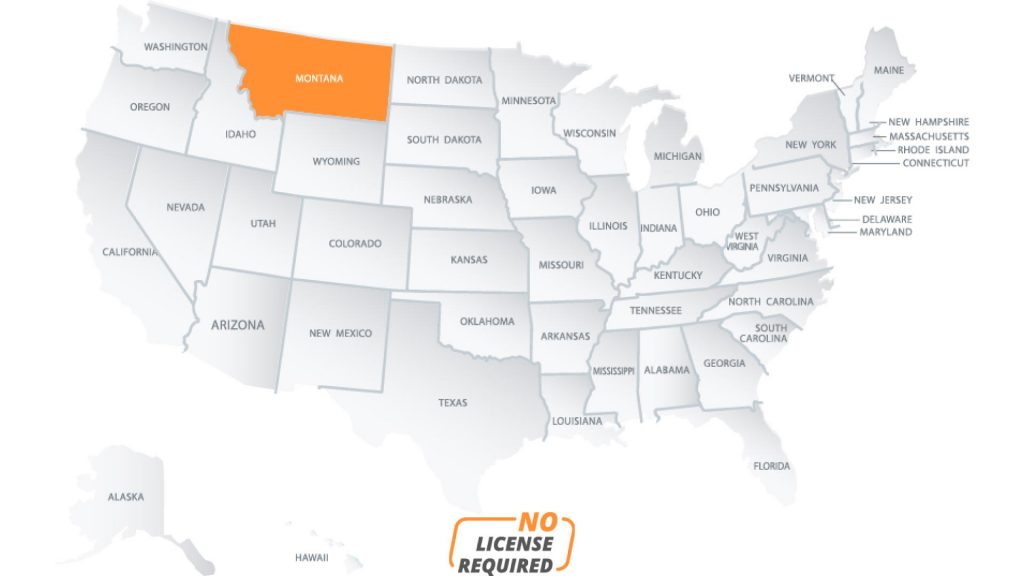
General contractors do not need to obtain a state license to work in Montana. Licensing is done at the local level so check with the local municipality for any permit or registration requirement. Businesses working in Montana with employees must provide proof of a valid Montana workers’ compensation insurance policy.
Learn more about Montana General Contractor License and insurance requirements.
Nebraska
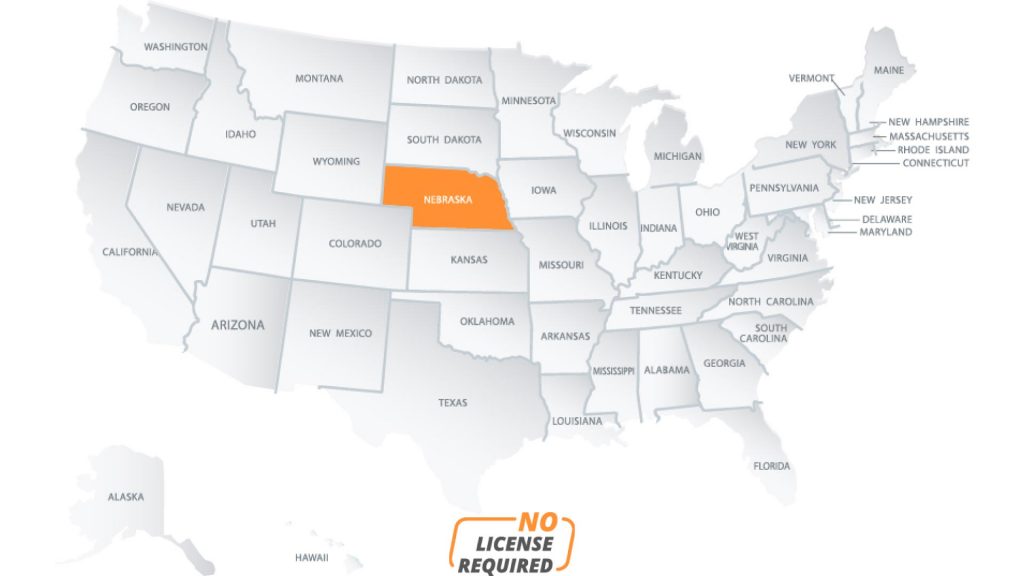
General contractors do not need to obtain a state license to work in Nebraska. Licensing is done at the local level so check with the local municipality for any permit or registration requirement. However, if you do any work that is considered construction, alterations, renovations, additions, installations or repairs, you need to register with the Department of Labor.
All contractors with one or more employees must provide a current Workers’ Compensation Certificate of Insurance with the Department of Labor listed as the certificate holder.
Learn more about Montana General Contractor License and insurance requirements.
Nevada

All businesses or individuals who construct or alter any building, highway, road, parking facility, railroad, excavation, or other structure in Nevada must be licensed by the Nevada State Contractors Board. Contractors, including subcontractors and specialty contractors must be licensed before submitting bids. Licenses may be issued to individuals, general partnerships, limited partnerships, corporations, limited liability companies or joint ventures.
The Nevada State Contractors Board issues licenses to contractors in particular trades or fields of the construction profession. Each separate trade is recognized as a “classification.”
The Nevada State Contractors Board issues licenses for the following classifications:
Class “A”—General Engineering Contractor.
The principal business is in connection with fixed works requiring specialized engineering knowledge and skill.
Class “B”—General Building Contractor.
The principal business is in connection with the construction or remodeling of buildings or structures for the support, shelter and enclosure of persons, animals, chattels or movable property of any kind, requiring in their construction the use of more than two unrelated building trades or crafts, upon which he or she is a prime contractor and where the construction or remodeling of a building is the primary purpose.
Class “C”—Specialty Contractor.
There are 36 separate primary “C” license classifications for contractors whose construction work requires special skill and whose principal contracting business involves the use of specialized building trades or crafts. Manufacturers are considered to be contractors if engaged in on-site construction, alteration, or repair.
Learn more about Nevada general contractor license and insurance requirements.
New Hampshire

General contractors do not need a state license to work in New Hampshire. However, make sure to check local licensing requirements before you begin work.
Learn more about New Hampshie General Contractor License and insurance requirements.
New Jersey
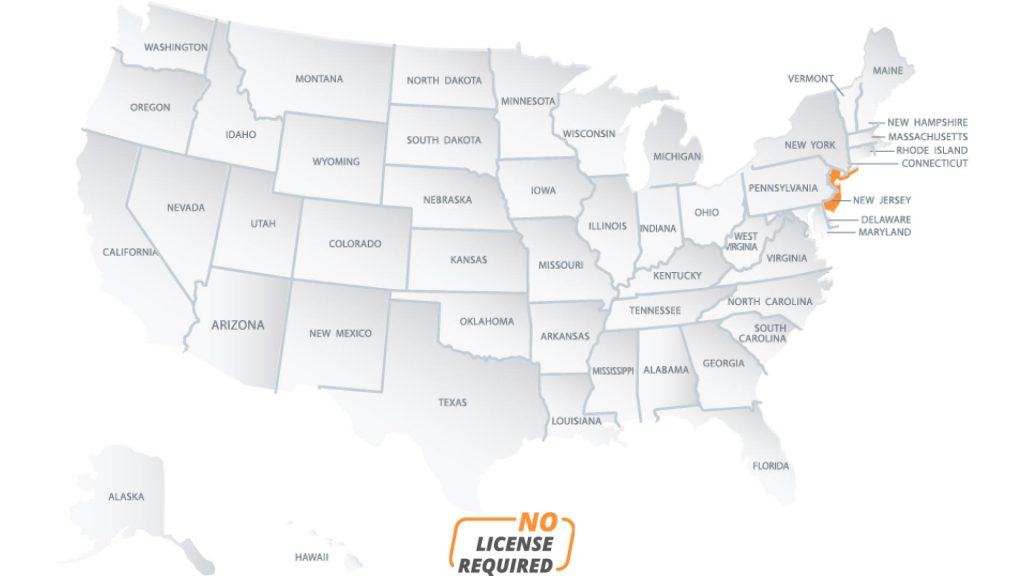
There are no state licensing requirements for general contractors in New Jersey; however you will need to register for a home building license with the New Jersey Department of Community Affairs or for a home improvement license with the New Jersey Division of Consumer Affairs. Commercial construction contractors are licensed at the city or county level.
Learn more about New Jersey general contractor license and insurance requirements.
New Mexico

New Mexico issues licenses to qualified business entities that employ or are owned by one or more Qualifying Parties (QP) who are validly certified by CID to perform the scope of work in which the licensee intends to engage.
How does a person become a Qualifying Party?
A. QP applicants must have the required number of years experience in the field in which they are applying. The experience must be within the 10 years immediately preceding application.
B. QP applicants must pass the exam(s) applicable to the classification being sought, as well as a Contractor’s Business and Law exam.
C. Applicants must be pre-approved to schedule exams.
How does an applicant schedule exams to become a Qualifying Party?
A. Applicant must submit a completed QP application and work Experience affidavit to PSI with a $36 fee. The applicant’s signature must be notarized.
B. Applicants should use as many Affidavits as necessary to cover the period of experience required for the classification being sought.
C. Each person attesting to an applicant’s work experience must use a separate Work Experience Form/Affidavit. (Applicant can fill out “Applicant” portion of the Affidavit.)
D. The person attesting to the applicant’s work experience must fill out the “Affiant” portion.
E. The signature of the Affiant must be notarized.
A $10,000 consumer protection bond is required. Workers’ compensation insurance is required.
Learn more about New Mexico general contractor license and insurance requirements.
New York
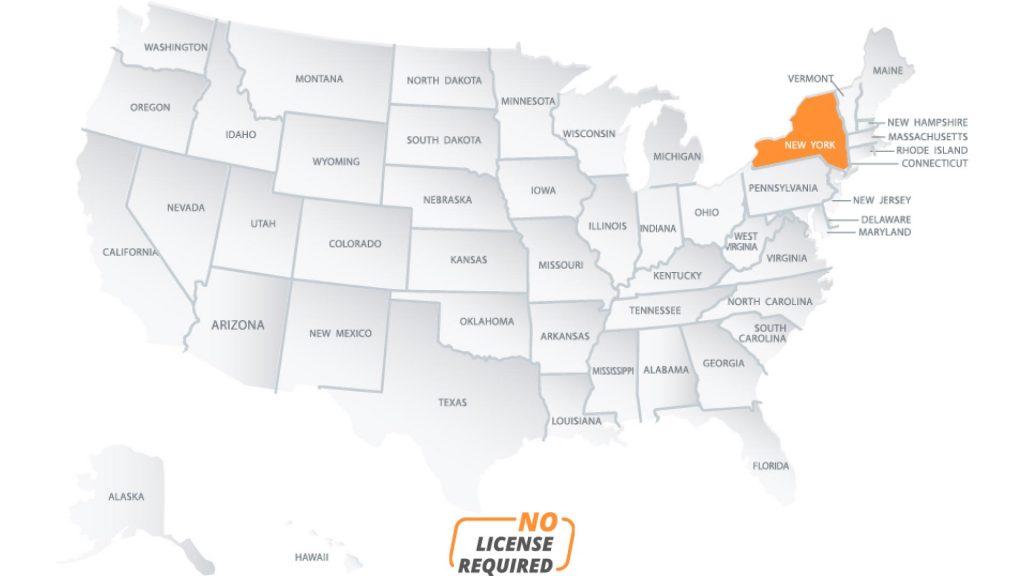
General contractors do not need to obtain a state license to work in New York. Licensing is done at the local level so check with the local municipality for any permit or registration requirement.
North Carolina

General contractors must have a state license to work in North Carolina if the projects they work on are worth more than $30,000. The general contractor license is issued by the North Carolina Licensing Board for General Contractors.
License Classifications
Building Contractor
This classification covers all building construction and demolition activity including: commercial, industrial, institutional, and all residential building construction. It includes parking decks; all site work, grading and paving of parking lots, driveways, sidewalks, and gutters; storm drainage, retaining or screen walls, and hardware and accessory structures; and indoor and outdoor recreational facilities including natural and artificial surface athletic fields, running tracks, bleachers, and seating. It also covers work done under the specialty classifications of S(Concrete Construction), S(Insulation), S(Interior Construction), S(Marine Construction), S(Masonry Construction), S(Roofing), S(Metal Erection), S(Swimming Pools), and S(Asbestos), and S(Wind Turbine).
Residential Contractor
This classification covers all construction and demolition activity pertaining to the construction of residential units that are required to conform to the residential building code adopted by the Building Code Council pursuant to G.S. 143-138; all site work, drive – ways, sidewalks, and water and wastewater systems ancillary to the afore – mentioned structures and improvements; and the work done as part of such residential units under the specialty classifications of S(Insulation), S(Interior Construction), S(Masonry Construction), S(Roofing), S(Swimming Pools), and S(Asbestos).
The primary requirements for licensing include, completing the application, be at least 18 years of age, possess good moral character, meet the minimum financial requirement based on the limitation of license you are applying for, and successfully completing an examination based on the desired classification of license.
License Classification
- North Carolina Unlimited Building Contractor License
Applicants must provide audited financials showing at least $150,000 in working capital or meet the bond requirement.
- North Carolina Unlimited Residential Contractor License
Applicants must provide audited financials showing at least $150,000 in working capital or meet the bond requirement.
- North Carolina Intermediate Building Contractor License
Applicants must provide audited financials showing at least $75,000 in working capital or meet the bond requirement.
- North Carolina Intermediate Residential Contractor License
Applicants must provide audited financials showing at least $75,000 in working capital or meet the bond requirement.
- North Carolina Limited Building Contractor License
Applicants must either have at least $17,000 in working capital, have a net worth of at least $80,000, or meet the bond requirement.
- North Carolina Limited Residential Contractor License
Applicants must either have at least $17,000 in working capital, have a net worth of at least $80,000, or meet the bond requirement.
It is important to note that they say a bond can be obtained to meet the net worth requirements, however no surety company will be willing to issue a bond without financial statements and net worth that would be sufficient to comply with the requirements of the State directly. Hence it is the classic “Catch 22”
Learn more about North Carolina general contractor license and insurance requirements.
North Dakota

All contractors in North Dakota require a state license to work on projects worth more than $4,000. A contractor is considered any person who constructs, repairs, alters, dismantles or demolishes “bridges, highways, roads, streets, buildings, airports, dams, pipelines, and every other structure, project, development or improvement” of property.
- A class A license is required for contracts over $500,000.
- A class B license is required for contracts valued between $300,000 and $500,000.
- A class C license is required for contracts valued between $100,000 and $300,000.
- A class D license is required for contracts of $100,000 or less.
A current certificate of liability insurance from the insurance provider verifying coverage is required. Contractors with employees must also have workers’ compensation insurance.
You must show proof of insurance before you’ll be granted a license from the Secretary of State.
Learn more about North Dakota general contractor license and insurance requirements.
Ohio

A general contractor does not need a state license to work in Ohio for small projects that cost less than $1,000. Licenses are only required for electrical, plumbing, HVAC, and refrigeration, for which you’ll need to get a statewide license issued by the Ohio Construction Industry Licensing Board.
To apply for a statewide general contractor license in Ohio, you’ll need to:
- Be 18 or over.
- Be a U.S. citizen or legal alien with proof of residence.
- Have worked as a tradesperson for at least five years, be a registered engineer or have equivalent experience.
- Not have been convicted of a crime.
- Pass the exam.
- Prove you have at least $500,000 in contractor liability insurance.
- Pay a $25 application fee.
You can apply for a general license at the local level if you aren’t going to be specializing in any trades (HVAC, electrical, plumbing, or refrigeration).
It is important to note that in most Cities in Ohio you will need to meet their specific requirements to register as a GC or before a permit will be issued. In most situations they will require an application, Certificate of insurance and a Surety Bond.
Learn more about Ohio general contractor license and insurance requirements.
Oklahoma
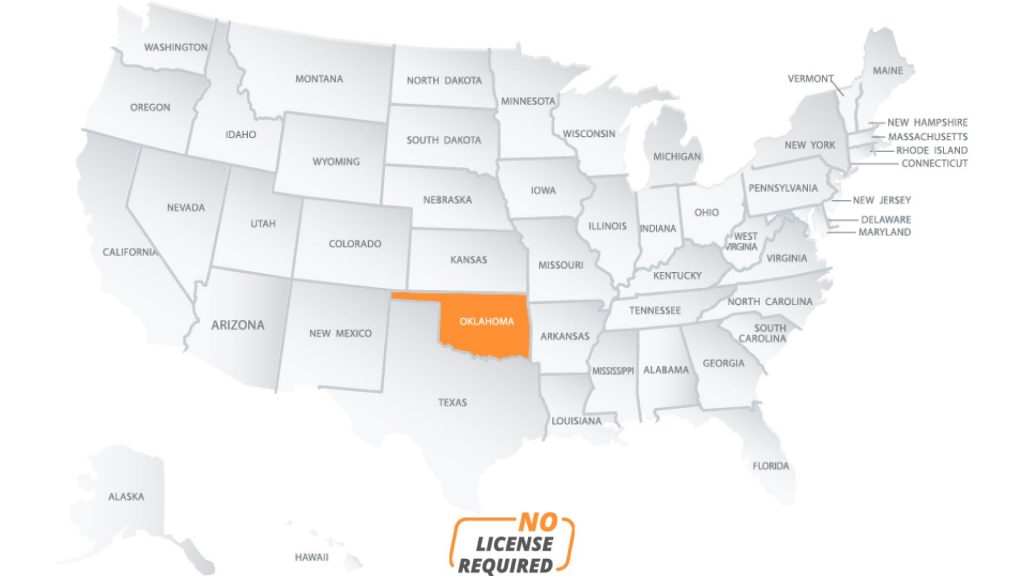
General contractors do not need to obtain a state license to work in Oklahoma. Licensing is done at the local level so check with the local municipality for any permit or registration requirement.
Learn more about Oklahoma general contractor license and insurance requirements.
Oregon

A general contractor must hold a state license to work in Oregon. A contractor is considered any person who is paid to do any construction work that involves an improvement to real property.
You can apply for a residential contractor license, a commercial license or a dual residential and commercial license. The license is awarded by the Oregon Construction Contractors Board (CCB). You must complete pre-license training and take a test. Liability insurance coverage requirements range from $500,000 per occurrence to $2,000,000 aggregate insurance depending on the classification. Contractors with employees are also required to have workers’ compensation coverage.
There is also a surety bond requirement for both the residential and commercial license. You need to have a surety bond in the amount required for the type of license you want. Bond amounts range from $20,000 to $75,000 depending on the classification. Besides general liability insurance you will need workers’ compensation insurance if you have employees, as well as Oregon Business and Federal Employer identification numbers.
Learn more about Oregon general contractor license and insurance requirements.
Pennsylvania
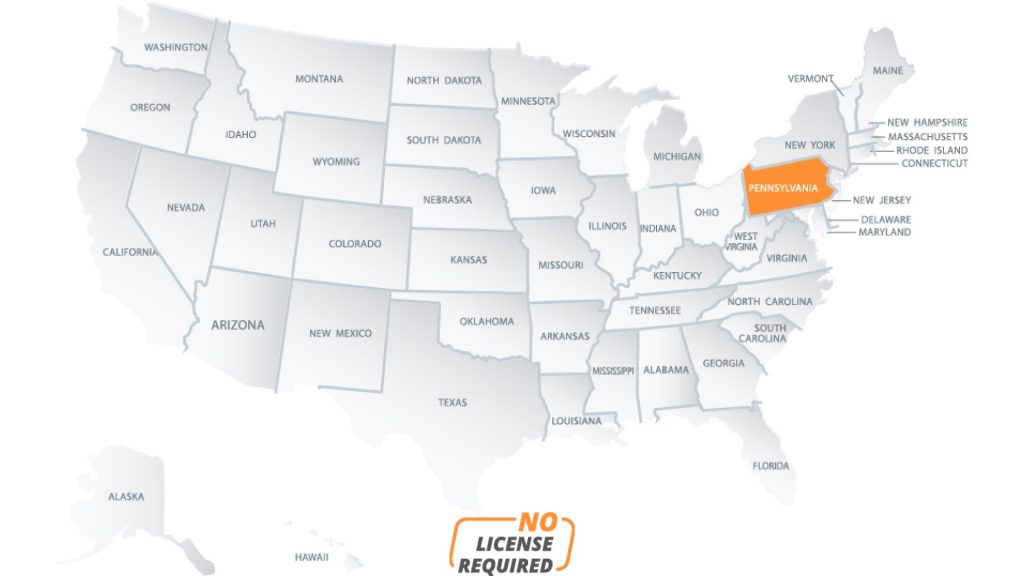
General contractors do not need to obtain a state license to work in Pennsylvania. Licensing is done at the local level so check with the local municipality for any permit or registration requirement. However, if you do more than $5,000 worth of work on home improvement projects per year, you need to register with the Attorney General’s Office.
Rhode Island
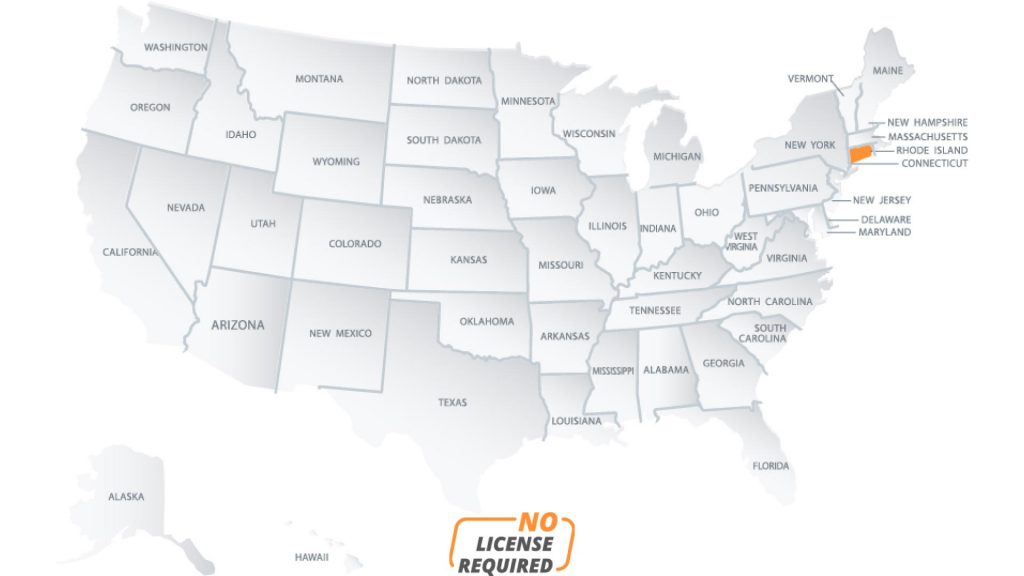
There is no licensing requirement for general contractors in Rhode Island; however, there is a comprehensive registration process. All contractors and subcontractors who are involved in commercial construction, home construction, alterations, remodeling or repairs to property, must register with the Contractors’ Registration and Licensing Board.
You must complete five hours of pre-license education and must show proof of liability insurance. Contractors must submit a certificate of liability insurance showing at least $500,000 of coverage. Workers’ compensation insurance is also required for contractors with employees
Learn more about Rhode Island general contractor license and insurance requirements.
South Carolina

General contractors will require a General and Mechanical Contractors License to work in South Carolina on any commercial construction jobs worth over $5,000. The general contractor license is awarded by the South Carolina Department of Labor, Licensing and Regulation. You’ll need to show proof of two years of experience in the past five year and pass a trade exam, as well as a business and law exam.

General contractor licenses are issued in 5 different group numbers:
Group 1 contractors are eligible to work on projects costing $50,000 or less; Group 2 contractors are eligible for projects costing up to $200,000; Group 3 contractors are eligible for projects costing up to $500,000; Group 4 contractors are eligible for projects costing up to $1,500,000; and Group 5 contractors are eligible for projects of any cost.
General contractors must meet a net worth requirement or submit a surety bond. Net worth requirements vary by group numbers and are as follows:
Group 1: $10,000; Group 2: $40,000; Group 3: $100,000; Group 4: $175,000; Group 5: $250,000. For proof of meeting the net worth requirement, contractors in groups 1 or 2 must submit a self-prepared, notarized balance sheet; contractors in groups 3 or 4 must submit a financial statement reviewed on a GAAP basis; and contractors in group 5 must submit a financial statement audited on a GAAP basis.
General contractors must submit a surety bond or meet a net worth requirement. Bond amounts vary by group numbers and are as follows:
Group 1: $20,000; Group 2: $80,000; Group 3: $200,000; Group 4: $350,000; Group 5: $500,000. In order to obtain surety bonds in this amount surety companies will require financial statements that are more comprehensive than the State requirements.
Learn more about South Carolina general contractor license and insurance requirements.
South Dakota
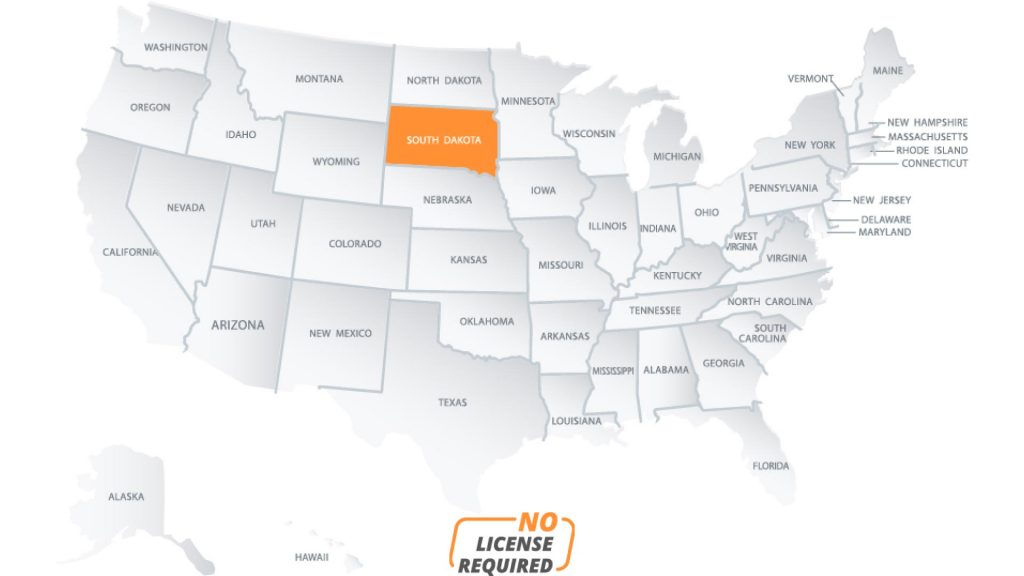
General contractors do not need to obtain a state license to work in South Dakota. Licensing is done at the local level so check with the local municipality for any permit or registration requirement.
Learn more about South Dakota general contractor license and insurance requirements.
Tennessee

General contractors must hold a contractors license before they can bid on or negotiate prices for any projects that are worth $25,000 or more. This applies to any person who oversees or performs any construction, repair or installation for buildings, land, highways, public utilities, and more. A prime contractor; an electrical, mechanical, plumbing, HVAC, or roofing subcontractor; a masonry subcontractor on a project worth at least $100,000; or as a construction manager on projects worth at least $25,000. Unlimited licenses are available for contractors with at least $300,000 of working capital and a net worth of at least $300,000.

You’ll need to show proof of experience, proof of insurance, and a financial statement. You’ll also need to pass a trade exam, as well as a business and law exam. General contractors are licensed by the TN Department of Licensing and Insurance, Board for Licensing Contractors.
Contractors must provide a certificate of insurance as proof of having general liability and workers’ compensation insurance. The coverage minimums for general liability insurance depend on the monetary license limit requested: Contractors requesting a monetary limit of up to $500,000 need at least $100,000 of coverage, contractors requesting a limit of between $500,001 and $1,500,000 need at least $500,000 of coverage, and contractors requesting a limit of $1,500,001 or more need at least $1,000,000 in coverage.
Home improvement contractors are also required to register and provide a bond.
Learn more about Tenesse general contractor license and insurance requirements.
Texas
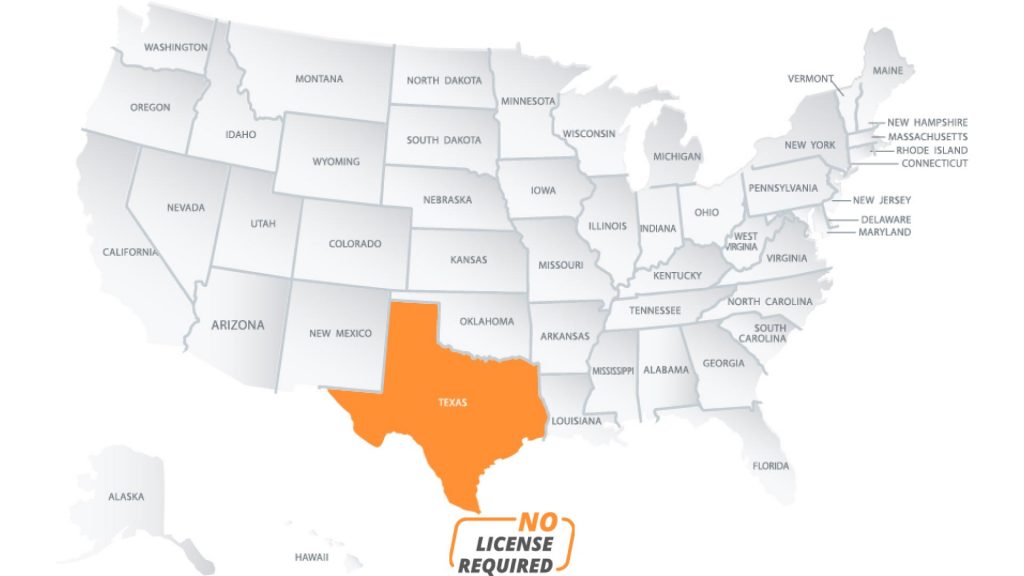
Texas does not require a general contractor license at the state level. However, there are local licensing requirements in some cities, so make sure to check with your city or county before you start any work.
It’s also a requirement for every business to have a Texas Business License. Most contractors are required to obtain a department of revenue contractor’s excise tax license.
More and more municipalities are now requiring proof of insurance and a bond before any projects can start. It is always best to check with them to see the specific requirements.
Utah

A general contractor requires a state license to do any work in Utah that is worth more than $3,000. The General Building Contractor License is awarded by the Utah Division of Occupational and Professional Licensing.
To qualify, you must show proof of general liability and worker’s compensation insurance, as well as proof of financial responsibility. You need to show two years of experience in the past ten years. You will also need to pass a trade exam and a business and law exam.
A general liability insurance certificate with minimum required coverage of $100,000 for each incident and $300,000 in total with DOPL listed as certificate holder. Workers’ compensation insurance is also required for contractors with employees.
Learn more about Utah general contractor license and insurance requirements.
Vermont
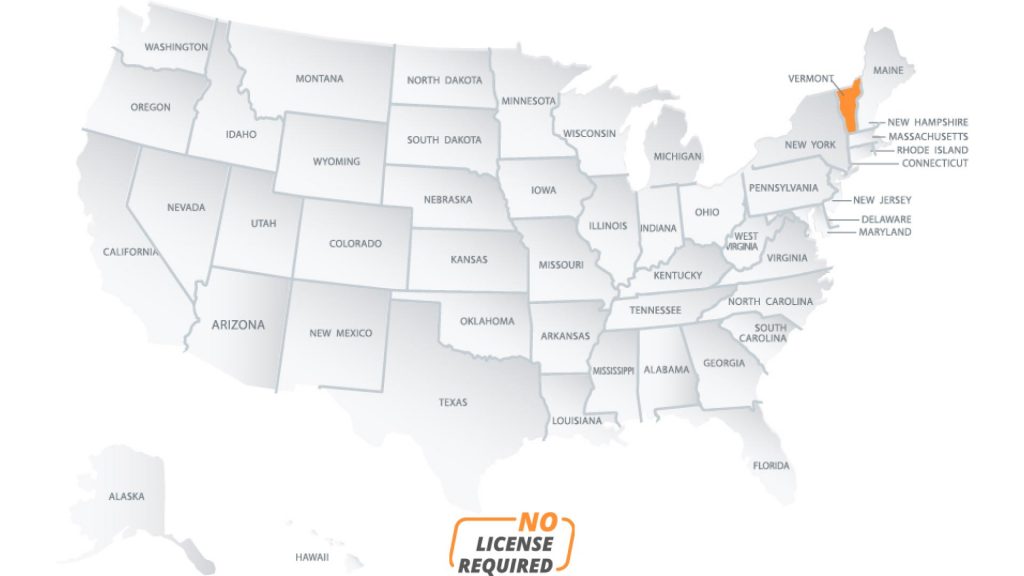
General contractors do not need to obtain a state license to work in Vermont. Licensing is done at the local level so check with the local municipality for any permit or registration requirement.
Learn more about Vermont general contractor license and insurance requirements.
Virginia

General contractors must have a state license, issued by the Department of Professional and Occupational Regulation, in order to work in Virginia.
Virginia Class A Contractor Firm License
Any contractor who undertakes a project the total value of which is $120,000 or more is required to have a Class A license. Applicants must have a net worth of at least $45,000. Contractors have the option of filing a $50,000 surety bond, submitting a financial statement form, or submitting financial statements reviewed or audited by a CPA.
Virginia Class B Contractor Firm License
Any contractor who undertakes a project the total value which is between $10,000 and $120,000 is required to have a Class B license. Applicants must have a net worth of at least $15,000. Contractors have the option of filing a $50,000 surety bond, submitting a financial statement form, or submitting financial statements reviewed or audited by a CPA.
Virginia Class C Contractor Firm License
Any contractor who undertakes a project the total value which is between $1,000 and $10,000 is required to have a Class C license. There is no net worth requirement for Class C licenses.
For all classes of licenses, you must complete a pre-license education course approved by the Board of Contractors and then pass an exam.
The $50,000 bond in lieu of financial statements can be obtained for around $900. It is good for 2 years. The applicant must have good credit, with a credit score of greater than 700 and no bankruptcies.
Learn more about Virginia general contractor license and insurance requirements.
Washington

You will need to register with the Washington State Department of Labor & Industries. General contractors can perform most types of construction work. They can hire subcontractors in multiple specialties. However, contractors working with plumbing, electrical, elevators, mobile home installation, boilers, and asbestos have additional requirements for education, examination, and licensing
You’ll need to show proof of a $12,000 surety bond and proof of General liability insurance coverage with $50,000 of property damage coverage and $200,000 public liability coverage or $250,000 of combined coverage. You also must pass an exam.
Learn more about Washintong general contractor license and insurance requirements.
West Virginia

General contractors who do any work on projects worth more than $2,500 require a general contractor license to work in West Virginia. The license is issued by the West Virginia Division of Labor.
There are multiple classifications of licenses, including general building and general engineering.Most businesses must register with the West Virginia Secretary of State You will also need to pass a trade exam, as well as a business and law exam. You must also show proof of worker’s compensation insurance. A wage bond status affidavit is required to be submitted with your application. If your entity is performing commercial construction work with employees.
Learn more about West Virginia general contractor license and insurance requirements.
Wisconsin

A general contractor must hold a Dwelling Contractor Qualifier license to work in Wisconsin on any construction projects worth more than $1,000. This includes construction, alterations, and improvements on residential, commercial, and public works projects. You must complete a 12-hour education course approved by the board and pass a test, and you must show proof of insurance. To obtain building permits, your business must hold a Dwelling Contractor license.
Contractors must either obtain liability coverage of at least $250,000 per occurrence or meet the bonding requirement. Workers’ compensation insurance is also required for contractors with employees.
Learn more about general contractor requirements in Wisconsin.
Wyoming
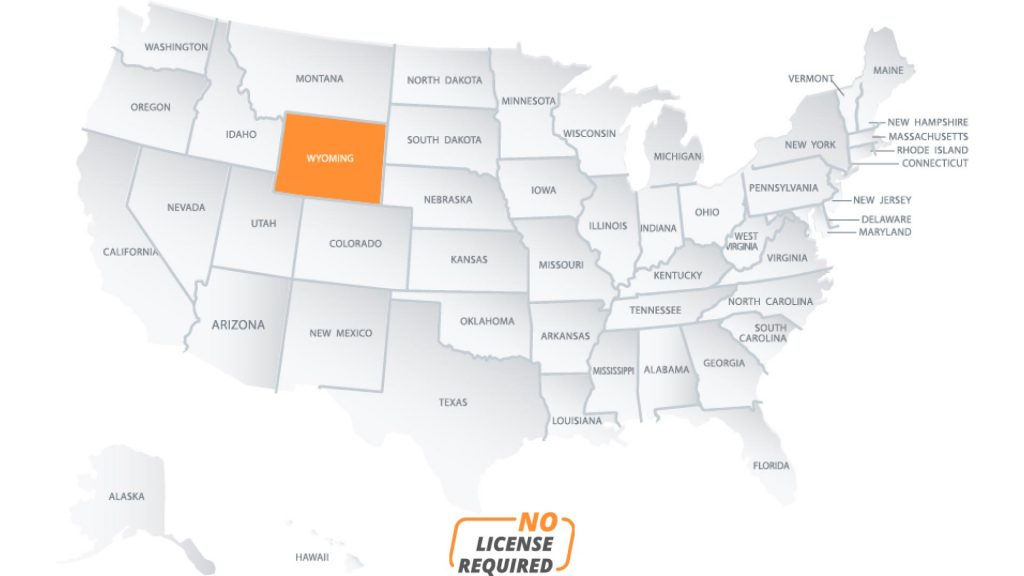
General contractors do not need to obtain a state license to work in Wyoming. Licensing is done at the local level so check with the local municipality for any permit or registration requirement.
Learn more about Wioming general contractor license and insurance requirements.
